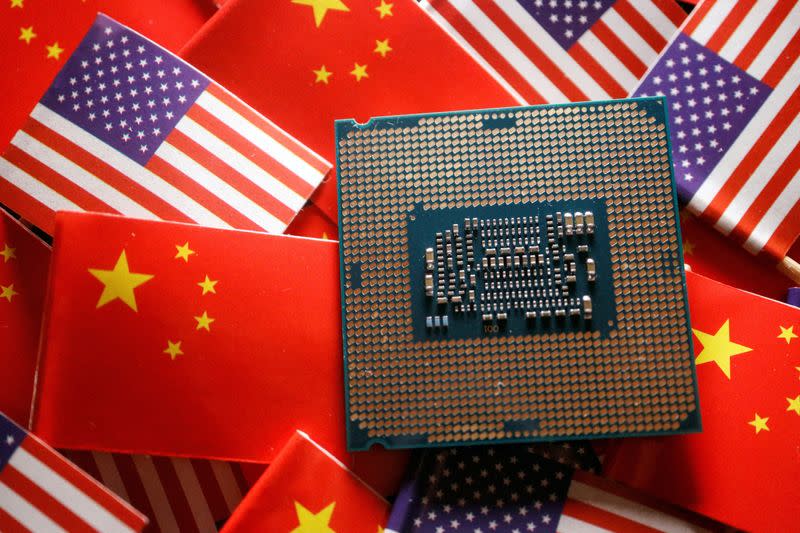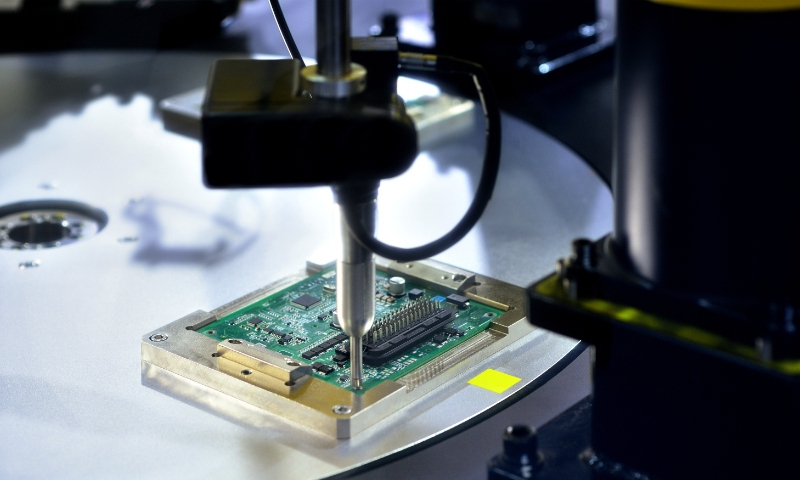Chinese Military And Others Acquire Nvidia Chips Despite US Export Restrictions; The Chip War Between The Two Countries Deepens
In a dance of technological prowess and geopolitical tensions, it recently came to the fore of China's strategic acquisition of Nvidia semiconductors despite stringent US bans on their export and Chinese military entities, state-backed AI research institutions, and universities have successfully procured batches of Nvidia chips over the past year. This defiance against export restrictions illuminates the persistent challenges faced by Washington in cutting off China's access to advanced US chips, crucial for fueling breakthroughs in artificial intelligence and military computing.

According to news reports, Chinese military organizations, state-sponsored artificial intelligence research institutions, and universities have procured restricted Nvidia semiconductors over the past year.
Despite the US ban on exporting these chips to China, sales from relatively unknown Chinese suppliers illustrate the challenges faced by Washington in completely severing China’s access to advanced US chips.
These chips, crucial for advancements in artificial intelligence (AI) and sophisticated military computers, include Nvidia’s A100 and the more potent H100, banned from export to China and Hong Kong in September 2022, along with the A800 and H800 chips, prohibited in October of the same year, designed specifically for the Chinese market.

The graphic processing units (GPUs) produced by Nvidia are widely acknowledged as superior for AI tasks due to their efficient processing of vast amounts of data required for machine learning.
Despite the restrictions, the tender documents examined reveal numerous Chinese entities, including elite universities and those subject to US export limitations such as the Harbin Institute of Technology and the University of Electronic Science and Technology of China, have acquired and taken possession of Nvidia semiconductors since the imposition of restrictions.
Notably, Nvidia previously held a 90% share of China’s AI chip market before the bans.
Despite emerging competition from entities like Huawei, this ongoing demand for and access to prohibited Nvidia chips also stresses the limited alternatives available to Chinese companies.
Even though purchasing or selling high-end US chips is not illegal in China, the persistence of acquiring banned Nvidia chips signals the absence of viable substitutes.
Among the purchasers are elite universities, along with two entities subjected to US export restrictions—namely, the Harbin Institute of Technology and the University of Electronic Science and Technology of China.
Both have faced accusations of involvement in military affairs or affiliation with a military body contrary to US national interests; for instance, the former procured six Nvidia A100 chips in May for deep-learning model training, while the latter acquired one A100 in December 2022, with its intended purpose remaining undisclosed.
The examination did not identify Nvidia or its approved retailers among the suppliers, and the origins of these suppliers’ procurement of Nvidia chips still need to be clarified.
Following US restrictions, an illicit market for such chips has emerged in China.
Chinese vendors have claimed to acquire excess stock that becomes available after Nvidia supplies large quantities to major U.S. companies. Alternatively, chips are imported through entities locally incorporated in countries like India, Taiwan, and Singapore.
Nvidia asserted its adherence to all relevant export control laws and emphasized that customers are also required to comply. A spokesperson for the company stated that immediate and appropriate action would be taken if any customer was found engaging in unlawful resale to third parties.
The US Department of Commerce refrained from commenting on the matter. While US authorities aim to close loopholes in export restrictions, efforts have been made to restrict access to chips by units of Chinese companies situated outside China.
Chris Miller, a professor at Tufts University and author of “Chip War: The Fight for the World’s Most Critical Technology,” argued that achieving watertight US export restrictions is unrealistic due to the small and easily smuggled nature of chips.
He suggested that the primary goal is to impede China’s AI development by complicating the construction of large clusters of advanced chips capable of training AI systems.
The review included over 100 tenders where state entities acquired A100 chips, and post-October bans revealed numerous tenders indicating purchases of the A800.
Recent tenders showed Tsinghua University procuring two H100 chips, while a Ministry of Industry and Information Technology laboratory obtained one.
One unidentified People’s Liberation Army entity in Wuxi sought 3 A100 chips in October and one H100 chip this month, according to military database tenders.

Despite most tenders being heavily redacted, it was evident that the chips were predominantly intended for AI applications.
Although the quantities purchased are relatively small, they are sufficient to perform complex machine-learning tasks and enhance existing AI models, even if they fall short of the substantial numbers required to build a sophisticated AI large language model from scratch, as estimated by research firm TrendForce.
In a specific instance, the Shandong Artificial Intelligence Institute granted a contract of 290,000 yuan ($40,500) last month to Shandong Chengxiang Electronic Technology for the procurement of 5 A100 chips.
Numerous tenders outline that suppliers must deliver and install the products before receiving payment.
Most universities have also issued notices confirming the completion of these transactions.
Tsinghua University, often likened to China’s Massachusetts Institute of Technology, consistently issues tenders and has acquired approximately 80 A100 chips since the imposition of the ban in 2022.
In December, Chongqing University released a tender for the purchase of a single A100 chip, explicitly specifying that it must be new and not second-hand or disassembled. The delivery was successfully accomplished this month, as indicated by a notice.

The Viewpoint
The Chinese-American chip war has emerged as a complex and multifaceted battleground, reflecting the broader geopolitical tensions between the two global powers.
At its core, the conflict revolves around the control, development, and access to advanced semiconductor technologies, which are crucial for powering a wide array of modern technologies, from artificial intelligence and data centers to military applications.
China
From the Chinese perspective, the chip war represents a quest for technological self-reliance and independence.
China has recognized its heavy reliance on imported semiconductor components, particularly from the United States, and aims to bolster its domestic chip industry to mitigate vulnerabilities associated with external dependencies.
Thus, the ambition aligns with China’s broader strategy to become a global tech powerhouse, reducing reliance on foreign technologies and asserting greater autonomy.
United States
On the American side, concerns center around safeguarding technological leadership, national security, and protecting intellectual property.
The US government, viewing the rapid advancement of China’s semiconductor capabilities as a potential threat, has implemented measures to restrict the export of advanced chips and technologies to Chinese entities, especially those with potential military applications.
The chip war has manifested in various ways, including export controls, sanctions, and efforts to restrict access to critical technologies.
The US government has been particularly vigilant in scrutinizing Chinese acquisitions of American semiconductor companies and imposing sanctions on Chinese tech firms accused of intellectual property theft and espionage.
Influencing The Business World
However, the chip war is not solely confined to governmental actions; it permeates the business domain as well.
Global chipmakers, like Nvidia, find themselves caught between the regulatory frameworks of both countries, and the emergence of an underground market for banned chips in China emphasises the resilience and adaptability of actors on the ground as they manage through the complexities of export restrictions and seek to fulfil technological needs.
Therefore, the Chinese-American chip war reflects the broader struggle for technological supremacy and dominance.
It includes not only the competition between nations but also the complicated interplay between government policies, corporate strategies, and the relentless drive for innovation in an era where technological advancements underpin economic strength and national security.

The Last Bit, As the demand for Nvidia chips persists in China, the limitations on alternatives become glaringly apparent.
The graphic processing units produced by Nvidia, renowned for their efficiency in processing vast amounts of data essential for AI, continue to dominate the market.
Yet, despite emerging competition from the likes of Huawei and others, the banned chips accentuate the unmet technological needs of Chinese firms.
The acquisition, detailed in publicly available tender documents, also raises questions about the effectiveness of export restrictions and the complex balance between technological innovation and geopolitical tensions, lets see what happens.




